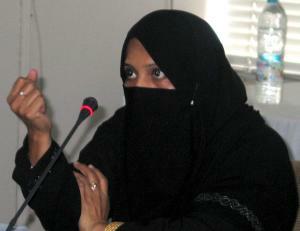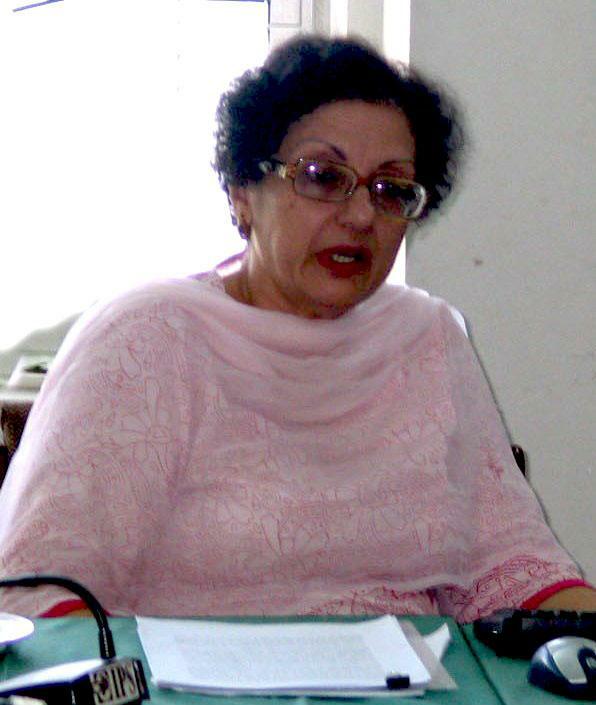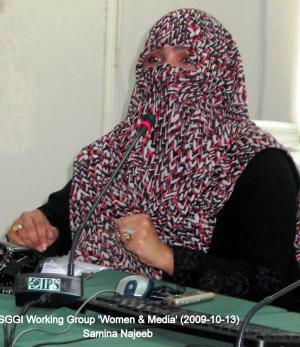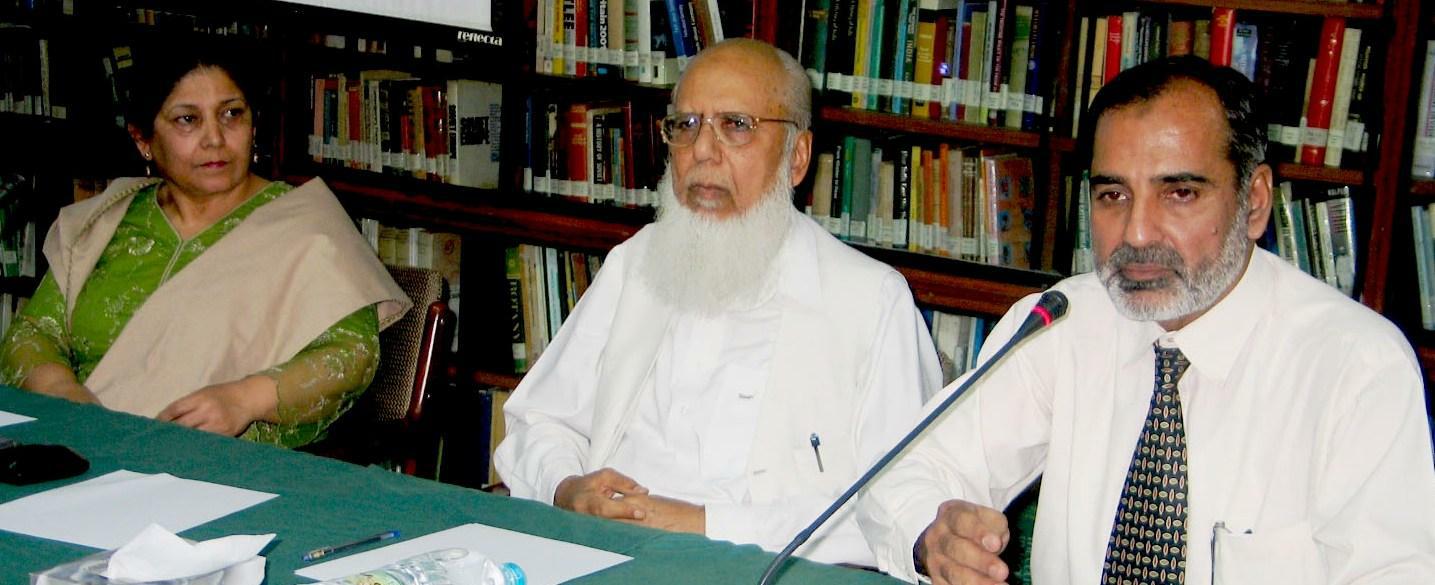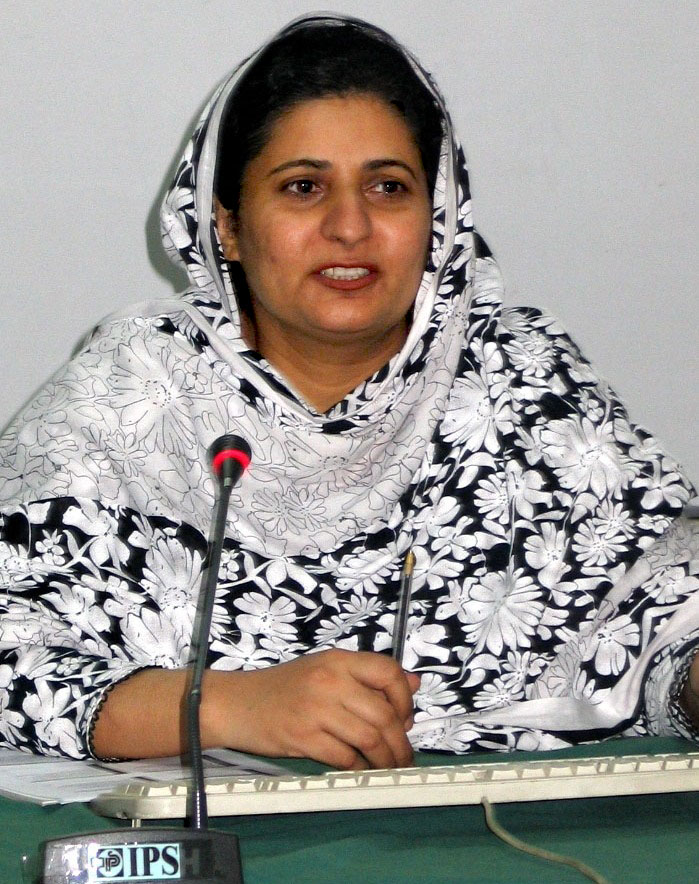Portrayal of Women in Advertisements and the PEMRA Ordinance
SGGI – Working Group on ‘Women & Media’ met for the fourth time with Mr. Khalid Rahman in the chair. Ms. Fehmida Malik presented her study on regulations about portrayal of women in advertisements under Pakistan Electronic Media Regulatory Authority (PEMRA) Ordinance, 2002.
SGGI Working Group on ‘Women & Media’ holds its 4th Roundtable
SGGI – Working Group on ‘Women & Media’ met for the fourth time with Mr. Khalid Rahman in the chair. Ms. Fehmida Malik presented her study on regulations about portrayal of women in advertisements under Pakistan Electronic Media Regulatory Authority (PEMRA) Ordinance, 2002.
Ms. Fehmida Malik started her presentation recalling the significance of media in today’s world and its exceptionally effective role in setting standards, establishing values and challenging traditional mindset. She brought into attention the fact that advertisements in print and electronic media are far more effective in leaving an impression on the minds of viewers and listeners than other programs and items.
Advertisements do not merely sell products; they sell concepts, values and beliefs too. They tell us who we are and what we should be and how we should govern our lives. Advertising industry has used women in this medium as a tool to attract the sights of viewers. Using scantily clad and attractive women as an object to stimulate desires among the public to use the advertised goods or services is a cheap yet globally practiced technique of advertising.
Women are frequently used to sell the products that they have nothing to do with. Using women to add glamour to the scene and equating them with purchasable commodities erodes self esteem of women, reinforces their subordinate position and devalues their intellectual and constructive role in the society.
The presenter elaborated PEMRA Ordinance, 2002, as amended by PEMRA (Amendment) Ordinance, 2007, and informed the audience that it deals with issuance of license for broadcast media. It mentions pre-requisites for a license and also lays down terms and conditions upon the licensee for the programs to be aired, including advertisements. A Code of Conduct under PEMRA laws has also been devised that provides guidance regarding contents of the programs and their underlying themes and ideas. Councils of Complaints have also been set up under the Ordinance to entertain and address the objections raised by public on contents broadcast by the electronic media.
Dilating upon the PEMRA Code of Conduct for media broadcasters and cable TV operators, she mentioned that advertisements, inciting obscenity in any way or glorifying adultery, lustful passions, or non-Islamic values, are not permitted. Any material targeting sanctity of home, family and marriage or containing indecent, vulgar, or offensive themes or treatment are also prohibited. Similarly, any advertisements containing material which is repugnant to ideology of Pakistan or Islamic values are also not allowed.
It is also imperative upon the advertisers under the said Code of Conduct to design their advertisements in such a manner that they conform to the Constitution of Pakistan and the laws of the country, and are not offensive to morality, decency and religious sects of the people of Pakistan. Elaborating the cultural values of the society like morality and decency, she underlined that Pakistani society derives these concepts from Islam that places the women at the pedestal of heights and reinforces the idea of giving them esteem. Thus, a woman’s status in the society as well as her appearance should reinforce the venerability and modesty in all circumstances.

Referring to the requirement of the Code of Conduct for the advertisements to conform with the Constitution of the country, she iterated that preamble of the Constitution as well as Article 31 oblige the government to take such steps as would enable the Muslims of Pakistan, individually and collectively, to order their lives in accordance with the teachings and requirements of Islam, as set out in the Quran and Sunnah. This means that the State would undertake and encourage measures to adopt Qura’n as a manual for life and would discourage all steps, depictions and efforts against it.
A number of advertisements can be pointed out that promote close intimacy of man and woman beyond the family relations, which are obviously in violation of this Code of Conduct. Since promotion of social inequalities is also proscribed, therefore, asymmetric and patriarchal hegemony in the society should also be discouraged.
Ms. Malik then compared the guidelines set out in PEMRA Ordinance with Press Law of Iran, Indian Advertising Law, Canadian Television Broadcasting Regulations and Turkish Law on the Establishment of Radio and Television enterprises. All these laws prescribe certain limitations and directions for commercial ads in their respective jurisdictions.
Press Law of Iran, ratified on March 19, 1986 and its Executive Bylaw, passed on January 31, 1987 prohibit the propagation of obscene and religiously forbidden acts and prescribe punishment for publication of indecent pictures and materials that offend public decency.
Indian advertising law asserts that no such advertisement shall be permitted which projects a derogatory image of women. Women must not be portrayed in a manner that emphasizes their passive and submissive qualities and encourages them to play a subordinate, secondary role in the family and society. The cable operators are obliged to ensure that portrayal of women, in the programs carried in their cable service is within the well established norms of good taste and decency.
Advertising Code prescribed under Section 6 of Cable Television Networks (Regulation) Act, 1995 of India asks for avoidance of indecent, vulgar, suggestive, repulsive or offensive themes or treatments in the advertisements. Similarly, broadcasting obscene or profane language or pictorial representation is forbidden under Canadian Television Broadcasting Regulations 1987.
Turkish Law on the Establishment of Radio and Television Enterprises and Their Broadcasts of 1994 (Law No. 3984) also requires the broadcast not to be obscene and encouraging violence or discrimination against women, weak and minors.
After putting forth the relevant provisions of Pakistani, Indian, Canadian, Turkish and Iranian laws setting guidelines for contents of advertisements, Ms. Fehmida Malik noted that provisions against obscenity and exploitative portrayal of women were commonly incorporated in the laws of secular as well as in Islamic republics. She, however, pointed out that the advertisers, in the four of five states mentioned, are seemingly not practicing the respective laws and regulations. Iranian law, however, is not merely on paper but actually in practice.

In Iran, implementation of the law has been made possible in its true spirit because the press law as well as the practice complements the values and conducts promoted and upheld by the state in the society as a whole. Morality and moral principles are safeguarded and promoted through a well established mechanism and dress code is not confined to media presentations, rather actually adopted and has to be practiced by men and women in daily life. Throughout the country, the Islamic dress code, imposed by the 1979 revolution, mandates that from the start of puberty, a woman outside her home or in the presence of an unrelated man must completely cover her hair and wear long loose-fitting clothes to hide her body.
Recommending reforms in the law as well as in its implementation mechanism, she said that code of conduct for the media should specify dress code for males and females that reflects the culture and real life in society and conforms to the widely held and commonly practiced traditions and values in the community.
While the State needs to ensure compliance with the provisions of all national laws, rules and regulations and procedures to redress public complaints too have to be made smooth, effective and easily accessible. Council of Complaints established under Section 26 of PEMRA Ordinance, 2002 has to be made more sensitive and responsive to public concerns. Police or FIA may be empowered to proactively check the exploitative and stereotypical presentation of women on media.
Stressing that awareness and education among the masses would prove the key to change, she suggested establishment of media watch groups on community level to monitor the media productions and to convey peoples’ feedback to the proper forum.
She also asked the media organizations and individuals to portray images and characters that promote healthy relationship among women and men; a relationship in which they complement each other’s contribution towards society instead of competing with each other. She called upon the media to promote such image of woman as would bring in light her multi-faceted and strong role in different spheres of life, and urged to refrain from using her as a ‘glamorizing agent’ in its productions or portraying her on peripheries of social life.
In the following discussion, the members expressed their concern on the negative depiction of women in media; they conveyed that a common Pakistani woman cannot be related to the one, portrayed in its media. In the media, she is used as a tool for marketing even those products and services with which women, generally, have nothing to do. Apprehension was also expressed that the organized and well-planned efforts were being made to transform the character of the society and to inculcate alien ideas in it through media.
Problems of implementation of laws were extensively discussed. It was felt that the laws were generally enacted in keeping with the spirit of the Constitution and sentiments of the people, and the legislators and policy makers had a good realization of the fact that any derogation in this respect was bound to invite public anger and fury; but still, the implementation of such laws, which seek to regulate lives of citizens under indigenous framework, seems to be deliberately avoided. Had there been a political will to uphold the principles contained in the Constitution and the law, the existing legislation would have proved sufficient to prevent any violation to women’s dignity and rights in the media.
The meaning and scope of words like morality, decency or obscenity are often disputed to hamper the operation of law. Actually, all these jargons have definite and established meanings in the public discourse and are unambiguously used in large segments of the society. To remove any doubt, however, it was suggested that people should be pursued and trained to raise their voices on issues of their concerns. It is viewed that despite a widespread discontentment over the contents of the programs and advertisements, proper forums are not approached for necessary action.

Silence on the part of people regarding unfair transmissions is construed as acceptance and the vicious circle of exploitation keeps on expanding. It was stressed that community efforts should be organized to spread awareness and make people sensitive over issues of women exploitation. On one hand, government need to make the Councils of Complaints easily accessible to the public and open its offices in all district headquarters, while on the other, people need to contact these councils more frequently and openly with their complaints. Similarly, raising voice on public forums and through letters to readers’ columns in newspapers can also be helpful in stopping the undesired productions.
It was also highlighted that certain other laws also required the state to curb the practices that could injure public morality and cause nuisance in the society. Production, sale, distribution, exhibition and even possession of obscene objects are punishable acts under Sections 292, 293 and 294 of Pakistan Penal Code. Similarly, advertisement, import or export of such material is also illegal. All these offences are also cognizable and not compoundable. It was suggested that these sections could be amended to meet the changes made in the media.
Director General of Institute of Policy Studies (IPS) Khalid Rahman concluded the session saying that non-implementation of laws and policies was a common problem to all aspects of national life; the governance standards need to be improved in all spheres of life. He said that the Minister of Information had recently admitted in his statement in the National Assembly that a number of TV and radio channels were operating in the country without proper licensing and that there was no code of conduct being followed by media. The laws, by and large, are not to be blamed in this respect.
In the given scenario, people will have to come forward and play their role, collectively in the form of ‘media watch groups’ or individually, to say at proper forums and through proper channels what people in Pakistani society, in fact, think. People also need to be informed as to what may be proper course to get their opinion registered.

There are certain segments in the society which present their viewpoints on different social themes and topics very proactively, and are often taken to represent the silent majority. The reality is opposite to this perception. It is imperative upon thinking members of the society to speak for themselves. Transplanting alien ideas in the society without considering the social construction and ignoring indigenous values and beliefs are bound to disturb the fabric of society and bring about a negative change.
Positive portrayal of women’s role, too, is not altogether missing from the media publications and broadcasts. There are certain advertisements that portray females in powerful, strengthened and decent roles as positive contributors to the national life. Such initiatives need to be appreciated and encouraged. He suggested that if large commercial groups could be pursued to adopt healthy practices in their advertising policies, change can definitely be brought into effect.
Mr. Rahman underscored that negative portrayal of women is an issue against which all sections of society, including those persons and groups which show a tendency towards liberal thoughts and ideas, are in a broad agreement. There may, therefore, be a possibility for individuals from different backgrounds to complement each other at least on this issue on various levels. He stressed that all gigantic efforts start from a single step and in the modern era, even an individual has the means to make a great difference. He also highlighted the need to do academic research and prepare useful proposals to improve governance and ensure better implementation of laws.


